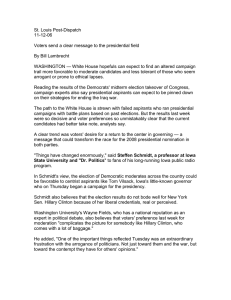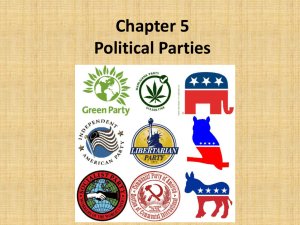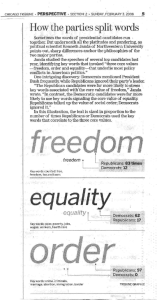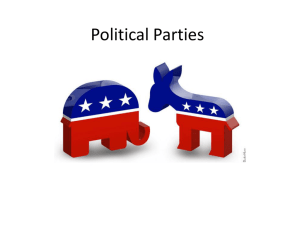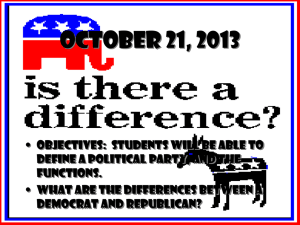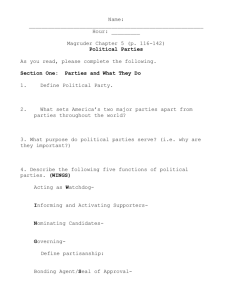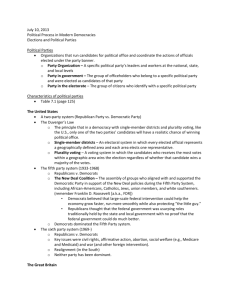St. Louis Dispatch 11-12-06 Trend toward centrist candidates may transform parties
advertisement
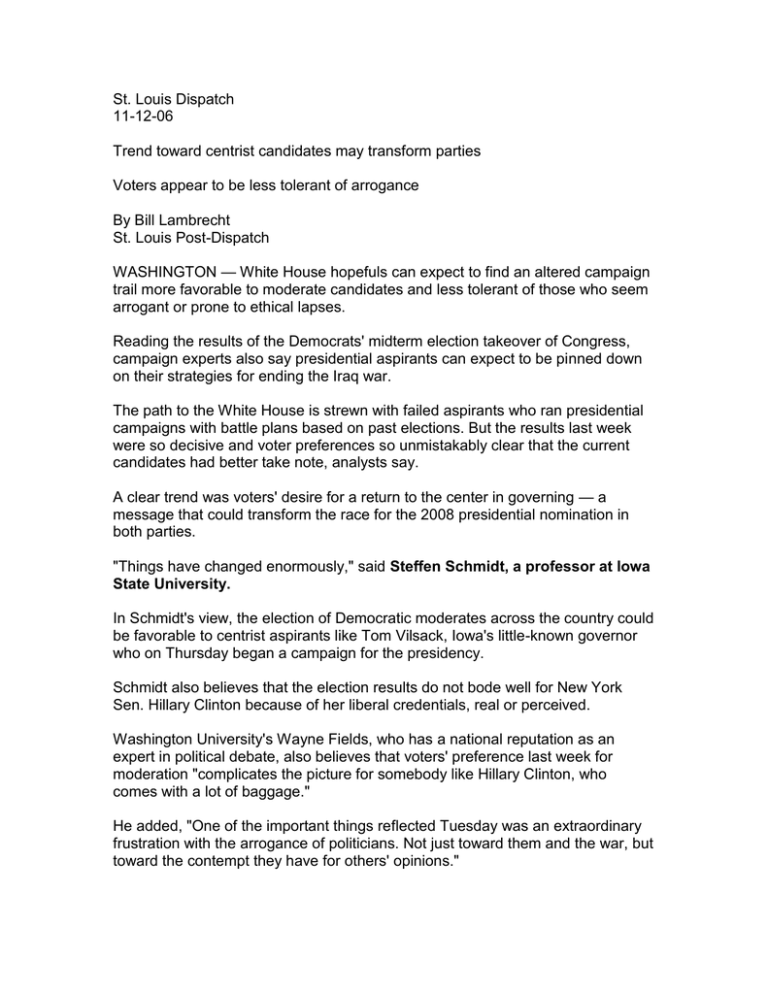
St. Louis Dispatch 11-12-06 Trend toward centrist candidates may transform parties Voters appear to be less tolerant of arrogance By Bill Lambrecht St. Louis Post-Dispatch WASHINGTON — White House hopefuls can expect to find an altered campaign trail more favorable to moderate candidates and less tolerant of those who seem arrogant or prone to ethical lapses. Reading the results of the Democrats' midterm election takeover of Congress, campaign experts also say presidential aspirants can expect to be pinned down on their strategies for ending the Iraq war. The path to the White House is strewn with failed aspirants who ran presidential campaigns with battle plans based on past elections. But the results last week were so decisive and voter preferences so unmistakably clear that the current candidates had better take note, analysts say. A clear trend was voters' desire for a return to the center in governing — a message that could transform the race for the 2008 presidential nomination in both parties. "Things have changed enormously," said Steffen Schmidt, a professor at Iowa State University. In Schmidt's view, the election of Democratic moderates across the country could be favorable to centrist aspirants like Tom Vilsack, Iowa's little-known governor who on Thursday began a campaign for the presidency. Schmidt also believes that the election results do not bode well for New York Sen. Hillary Clinton because of her liberal credentials, real or perceived. Washington University's Wayne Fields, who has a national reputation as an expert in political debate, also believes that voters' preference last week for moderation "complicates the picture for somebody like Hillary Clinton, who comes with a lot of baggage." He added, "One of the important things reflected Tuesday was an extraordinary frustration with the arrogance of politicians. Not just toward them and the war, but toward the contempt they have for others' opinions." Government that works Political historian Allan Lichtman, a failed candidate himself in Maryland's Democratic senatorial primary this year, saw voters' response to corruption in Washington as a key lesson for White House hopefuls. "We knew people were disgusted with the war," said Lichtman, a professor at American University in Washington. "The surprise was the extent to which people responded to the corruption and how tired they are of sold-out government. People want a government that works for them, not one that is sold-out, and on the Republican side, that works for John McCain." Other analysts said that the Arizona senator's frontrunner status among Republicans might also have been enhanced because of his appeal to independent voters and Republicans' potential problem in 2008 with independents, who abandoned the GOP in droves last week. The analysts also stress that Democrats will need to perform in Congress and avoid scandals if they expect the party's good fortune to continue. "A lot depends on what happens in the first months of 110th Congress," said Nathan Gonzalez, editor of the nonpartisan Rothenberg Political Report in Washington, "and how Democrats handle investigations and whether there are any other developments, such as indictments, and what side of the aisle they're on." Presidential aspirants also must realize that the outcome Tuesday was largely a rejection of Republicans rather than an embrace of Democrats, Democrats acknowledged. "The (exit) poll results indicate that voters still are not clear on what Democrats stand for," said Robert Borosage, co-director of the liberal Campaign for America's Future. Virginia Sen. George Allen's stunning collapse from likely presidential hopeful to defeated candidate has cleared room for one or more conservatives in the field at a moment of foment among conservatives in regard to GOP failures. "We have watched Republicans, who were elected by promising the highest standards of integrity, come to Washington to do good and stay to do well for themselves, their families and their friends, and thus demean the offices to which they were elected in the process," said David Keane, chairman of the American Conservative Union. Electoral math As candidates line up to run, many look to Illinois Sen. Barack Obama, the firstterm Democrat who has soared to national prominence with breathtaking speed and said recently that he is weighing a candidacy. In recent weeks, Democratic candidates across the country requested his assistance, and the 37 of them who won may feel indebted. Illinois Sen. Dick Durbin, a Democratic ally and adviser to Obama, observed that he hasn't witnessed an ability like Obama's to connect with crowds since the fleeting successes of Democratic Sens. Robert Kennedy and Eugene McCarthy in the 1960s. "You're dealing with a political phenomenon, and what he would bring to this race is rare in American politics. I think he's looking at it very seriously," Durbin said. The electoral math of 2008 also may have been affected by Democratic successes. Democrats netted six pick-ups of governor's offices, among them the swing states of Ohio and Colorado, which will provide organizational assistance in the presidential election. In a potentially key shift in voting trends, the Republican gains in the nation's fastgrowing Hispanic vote dropped from 40 percent in 2004 to 30 percent in congressional elections last week, a decline attributed in some quarters to the hard-edged immigration policies of the Republican-led Congress. Unless Republicans can reverse those losses, such shifts could alter results in a way that makes states like Arizona, New Mexico, Colorado and Nevada more friendly to Democrats. "The mishandling of the immigration issue by the Republicans may have handed the White House to the Democrats in '08," said Simon Rosenberg, president of the New Democratic Network, a party organization that works on Hispanic issues. Republican National Chairman Ken Mehlman, who announced Thursday that he would not seek to retain his post when his term expires in January, disputed that assessment. But he added, "America every day is less of a white country. We (Republicans) rely too much on white guys for our votes."
